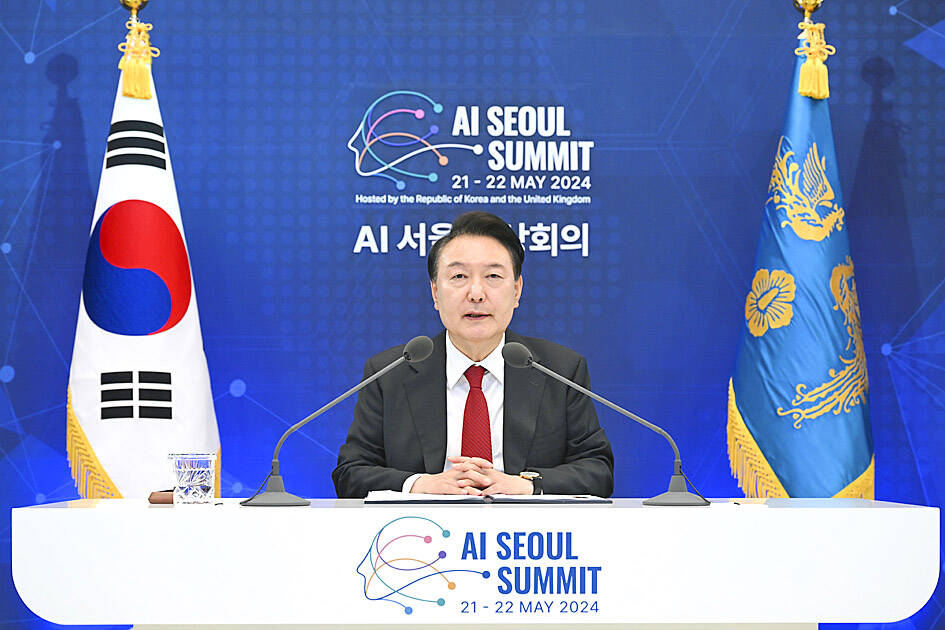South Korean President Yoon Suk-yeol yesterday announced a record US$19 billion support plan for the country’s crucial semiconductor industry.
South Korea is home to the world’s top memorychip makers Samsung Electronics Co and SK Hynix Inc and last year pledged to build the world’s largest chip center using US$456 billion of private investment as it seeks an edge in the global industry.
"We have created a comprehensive support program for the semiconductor industry worth 26 trillion Korean won, which encompasses financial, infrastructure, research and development, as well as support for small and medium-sized companies," he said, according to a statement from his office. The package includes a US$7 billion investment announced earlier this month.

Photo courtesy of South Korea Presidential Office via AP
Yoon also said Seoul would extend tax benefits for chip investments, in hopes of boosting employment and attracting more talent to the industry.
The country is also building a "mega chip cluster" just outside Seoul, which the government claims will be the world’s largest semiconductor-making complex and create millions of jobs.
"As you all know, semiconductors are a field of national all-out war," Yoon said.
"Winning or losing depends on who makes the state-of-the-art semiconductors with high information processing capabilities first. The state must provide support for semiconductors so that they do not lag behind competitors," he added.
With the new package, Yoon said there would be a "new semiconductor financial support program worth 17 trillion won" run through the Korea Development Bank to allow companies to make crucial new investments.
"As companies invest enormous amounts of money in facilities such as new factories and line expansions, liquidity problems arise," he said. "I believe that these difficulties will be largely resolved through the Korea Development Bank’s support program," he added.
The plan will also create a "semiconductor ecosystem fund" worth a trillion won, which will support fabless companies and small and medium enterprises linked to the industry.
"Our fabless market share is still in the one percent range, and foundry, which manufactures system semiconductors, is unable to close the gap with leading companies such as TSMC," Yoon said, referring to the Taiwanese chip giant, Taiwan Semiconductor Manufacturing Co (台積電).
Semiconductors are South Korea’s leading export and hit US$11.7 billion in March, their highest level in almost two years, accounting for a fifth of South Korea’s total exports, government figures showed.
Securing supplies of advanced chips has become a crucial issue internationally, with the US and China locked in a fierce battle for control of the market.
"South Korea is supplying 80 percent of the world’s memory semiconductors, and has said it is investing 300 trillion won in the Yongin cluster, but there has been a water supply issue with it," Kim Dae-jong, a professor of business administration at Sejong University in Seoul, told AFP.
"On top of tackling such issues, today’s announcement seems to be an effort to support innovative small and medium-sized enterprises to further strengthen their competitiveness against (rivals) like Taiwan."

MULTIFACETED: A task force has analyzed possible scenarios and created responses to assist domestic industries in dealing with US tariffs, the economics minister said The Executive Yuan is tomorrow to announce countermeasures to US President Donald Trump’s planned reciprocal tariffs, although the details of the plan would not be made public until Monday next week, Minister of Economic Affairs J.W. Kuo (郭智輝) said yesterday. The Cabinet established an economic and trade task force in November last year to deal with US trade and tariff related issues, Kuo told reporters outside the legislature in Taipei. The task force has been analyzing and evaluating all kinds of scenarios to identify suitable responses and determine how best to assist domestic industries in managing the effects of Trump’s tariffs, he

TIGHT-LIPPED: UMC said it had no merger plans at the moment, after Nikkei Asia reported that the firm and GlobalFoundries were considering restarting merger talks United Microelectronics Corp (UMC, 聯電), the world’s No. 4 contract chipmaker, yesterday launched a new US$5 billion 12-inch chip factory in Singapore as part of its latest effort to diversify its manufacturing footprint amid growing geopolitical risks. The new factory, adjacent to UMC’s existing Singapore fab in the Pasir Res Wafer Fab Park, is scheduled to enter volume production next year, utilizing mature 22-nanometer and 28-nanometer process technologies, UMC said in a statement. The company plans to invest US$5 billion during the first phase of the new fab, which would have an installed capacity of 30,000 12-inch wafers per month, it said. The

Taiwan’s official purchasing managers’ index (PMI) last month rose 0.2 percentage points to 54.2, in a second consecutive month of expansion, thanks to front-loading demand intended to avoid potential US tariff hikes, the Chung-Hua Institution for Economic Research (CIER, 中華經濟研究院) said yesterday. While short-term demand appeared robust, uncertainties rose due to US President Donald Trump’s unpredictable trade policy, CIER president Lien Hsien-ming (連賢明) told a news conference in Taipei. Taiwan’s economy this year would be characterized by high-level fluctuations and the volatility would be wilder than most expect, Lien said Demand for electronics, particularly semiconductors, continues to benefit from US technology giants’ effort

‘SWASTICAR’: Tesla CEO Elon Musk’s close association with Donald Trump has prompted opponents to brand him a ‘Nazi’ and resulted in a dramatic drop in sales Demonstrators descended on Tesla Inc dealerships across the US, and in Europe and Canada on Saturday to protest company chief Elon Musk, who has amassed extraordinary power as a top adviser to US President Donald Trump. Waving signs with messages such as “Musk is stealing our money” and “Reclaim our country,” the protests largely took place peacefully following fiery episodes of vandalism on Tesla vehicles, dealerships and other facilities in recent weeks that US officials have denounced as terrorism. Hundreds rallied on Saturday outside the Tesla dealership in Manhattan. Some blasted Musk, the world’s richest man, while others demanded the shuttering of his